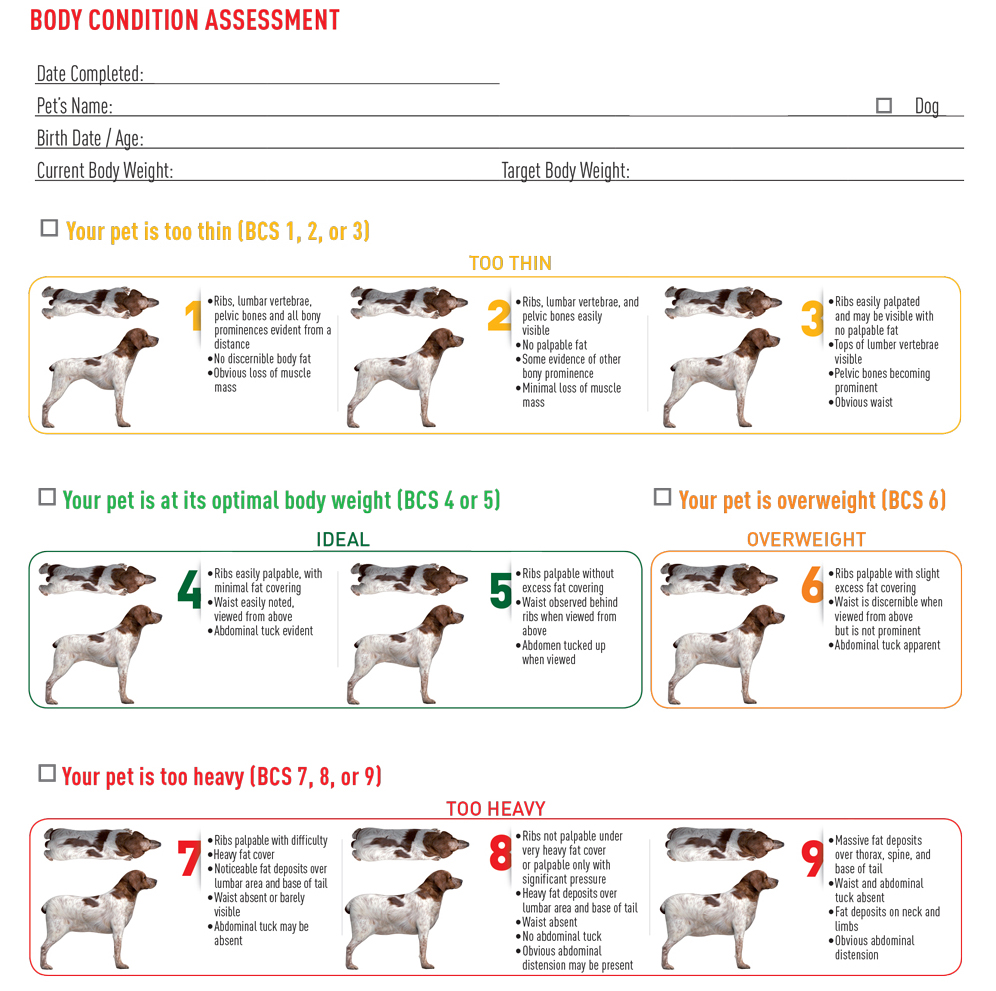How to tell if your dog is too big, too small or just right.

It’s that time of year when dog owners face their greatest temptation: to feed from the table or not to feed from the table. So many yummy scraps and such pleading eyes—it’s hard to resist!
Before you decide if you’re going to treat your dog to some of your holiday meal—and even then, only in moderation—take a look at his weight. Is your dog underweight, overweight or just right?
The answer to that question can be difficult to come by for the average dog owner. That’s why the Ohio State University Veterinary Medical Center and some pet food companies (e.g., Royal Canin, Nestlé Purina) provide descriptions on various weight levels to help pet owners evaluate their dog’s body condition.
- Emaciated: Ribs, lumbar vertebrae, pelvic bones and all body prominences evident from a distance. No discernible body fat. Obvious absence of muscle mass.
- Thin: Ribs easily palpated and may be visible with no palpable fat. Tops of lumbar vertebrae visible. Pelvic bones less prominent. Obvious waist and abdominal tuck.
- Moderate: Ribs palpable without excess fat covering. Abdomen tucked up when viewed from side.
- Stout/Overweight: General fleshy appearance. Ribs palpable with difficulty. Noticeable fat deposits over lumbar spine and tail base. Abdominal tuck may be absent.
- Obese: Large fat deposits over chest, spine and tail base. Waist and abdominal tuck absent. Fat deposits on neck and limbs. Abdomen distended.

Chances are, if your dog doesn’t fall into the moderate category, he is either overweight or obese. In fact, just as in the U.S. human population, obesity is a significant problem in our dogs. The reason for that is simple: Dogs are getting too much food and not enough exercise.
Many owners equate love with food, and frequently give their dogs snacks from the table, free choice kibble and an excess of dog treats. While your dog may be happy as he’s chowing down, the excess weight that results is taking time off his life. A canine weight study conducted by Nestlé Purina showed that overweight dogs live 1.8 years less than their ideal-weight siblings.
If your dog appears to be overweight, you should make an appointment with your veterinarian. The vet can verify that your dog has a weight issue and recommend the best diet to help him get fit. Generally speaking, cutting down on the amount of food your dog gets every day will help, along with increased activity. Since excess weight can put strain on your dog’s joints and seriously affect his health in the long term, it’s a good idea to talk to your vet before starting an exercise program.
If your dog happens to be underweight, check the feeding instructions on the label of the dog food you are giving him to make sure you are feeding the recommended amount. Consider increasing his portions by one-quarter and evaluating any weight gain over a two-week period. If your dog continues to stay thin despite an increase in food, or loses more weight, take him to your veterinarian for an exam. While it may just be his metabolism and activity level causing his svelte figure, it’s a good idea to have a vet check him out.
About the Author: Audrey Pavia is an award-winning freelance writer and author of “The Labrador Retriever Handbook.” She is a former staff editor of Dog Fancy, Dog World and The AKC Gazette magazines. To learn more about her work, visit www.audreypavia.com and hollywoodhoofbeats.net





